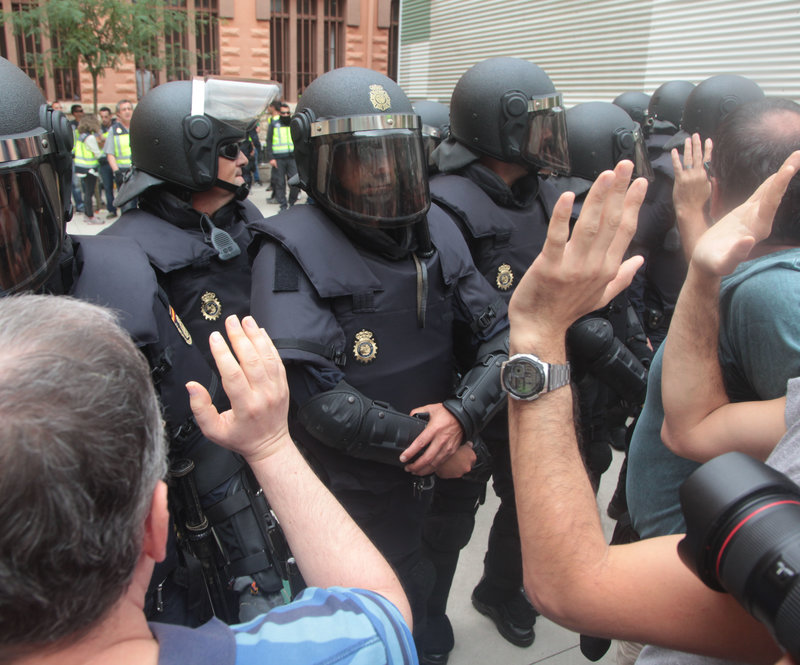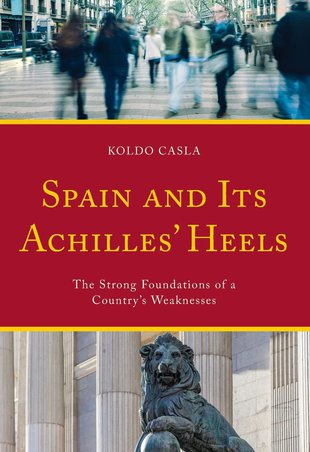The state of the Spanish State
Koldo Casla’s playful subtitle The Strong Foundations of a Country’s Weaknesses captures the relaxed tone of this serious investigation of Spanish politics today
Casla’s background is in law, which explains a great strength of the book REMARKABLY, GIVEN HIS SOBER ANALYSIS OF SPAIN’S ILLS, CASLA IS OPTIMISTIC
Unlike too many academic publications, Spain and Its Achilles’ Heels is attractively written, with colloquial turns of phrase and personal anecdotes. For example, he visits the Valle de los Caídos to illustrate Francoism and includes a photo of his sister helping a victim of an ETA bomb. Casla, both an academic and a civil rights activist, denounces injustice with passion and clarity. But he is no polemicist, for he also seeks to understand the point of view of the other side. Here, the slow process of reconciliation in the Basque Country after ETA acts as example and stimulus.
Casla’s background is in law, which explains a great strength of the book: his mastery of the detail of what was actually legislated. Casla has read the small print. His position is socially liberal, fervently pro-human rights and strongly opposed to Vox’s reductionist neo-Francoism. It is a pity that such a precise book is spattered with unseemly errors, though meaning is not greatly affected. Casla himself has written it in a foreign language: no mean feat. It is the publisher’s fault that there has been no proper proofreading.
The Achilles’ heels that weaken Spain’s democracy are four: the refusal of Spain’s ruling class to accept that there are several nations within the State; sweeping the Franco era under the carpet; lack of social protection, leading to mass poverty; and the inordinate interference of the Church in politics. Few contemporary historians are likely to disagree, though additions, such as the parasitic monarchy or endemic corruption, spring to mind.
Unchanging nation
Casla is rightly insistent that the idea of the nation was a 19th-century invention and scorns the Francoist claim, echoed by right-wingers since, from José María Aznar to Santiago Abascal, that Spain has been a single, great and Catholic nation since 1492 and even, in some overheated minds, since Roman times. He explains how real history involved “religious diversity, unlikely alliances and mercenaries on all sides”, but the invented past presents Spain as a “historically immutable reality” (p.31).
On this Achilles’ heel, Casla sees no solution: he believes that Spanish nationalists and the minority nations will just have to inhabit the same state while being more tolerant on both sides. It is a rather weak conclusion to his sharp analysis of the propaganda use of the resistance to the Romans of Numancia in the second century BC; or of the mayor of Móstoles declaring war on Napoleon in 1808; or of how “Reconquista”, used to describe the expulsion of the alien Moors, is a staple of PP and Vox election speeches. Casla does not countenance independence as a more feasible solution than ’tolerance’.
I would take issue with him on one important point: he sees the rise of Spanish nationalism in the 19th century as a ’mournful and hurt’ response to Basque and Catalan nationalisms (p. 30). Surely it is the reverse, certainly in the case of Catalonia, whose nationalism took off in the 1830s as a response to centuries of suffocating pressure by the State, most dramatically by Olivares in 1640-1641 and Felipe V in 1714. This said, his summary of the recent Catalan independence movement is clear and useful (pp.40-51).
No welfare
The second Achilles’ heel is Franco’s legacy. Casla is charitable with the agreements of the 1970s Transition, believing that they should now be renegotiated, but in the real circumstances of the time were about as good as could have been attained. The 1977 Amnesty Law was a false step in that it pardoned the dictatorship’s torturers, not just their victims. The ’Pact of Silence’ (not ’of Forgetting’, he argues, for no-one forgot) endangers democracy because it reduces awareness of past crimes. He highlights the deficiencies of the 2007 Ley de Memoria Histórica. He summarises neatly (pp.89-91) how the dictator Pinochet’s 1998 arrest in London inspired a new generation of Spaniards to tackle unresolved issues rooted in their own dictatorship.
Casla’s third Achilles’ heel is the lack of a Welfare State. While in Europe welfare provision improved in the 30 years of growing prosperity after 1945, in Spain Franco ruled. Then, in the new democracy, the advent of neo-liberalism left no time and space to develop a full-blown Welfare State. It is an enticing general argument, but missing from the account is that Felipe González could have done a whole lot more in his years of absolute majorities in the 1980s. The destruction of jobs under the banner of modernisation was not inevitable, but a political choice. Casla also analyses the housing crisis, based on the passion of all governments since the 1950s to encourage home ownership. Though presented as a route to working-class prosperity, recent years have shown that it leads to mass homelessness.
The Catholic Church’s notorious alliance with Franco and several centuries of supporting the most reactionary politics are also explained. Even this most intractable Achilles’ heel can change, Casla believes. He points to the Basque Church that opposed Franco, the worker-priests of the 1960s and Cardinal Tarancón’s opposition to the dictatorship in the 1970s. However, as he himself intimates, in recent years a weakened Church hierarchy is again vociferously intervening in politics, demonstrating in the streets against abortion, LGBT+ rights or gay marriage.
Remarkably, given his sober analysis of Spain’s ills, Casla is optimistic, arguing in his final chapter that ’Vulnerabilities Need Not Be Weaknesses’. Successive governments’ refusal to do anything serious to combat climate change, the mass poverty he himself charts or the rise of fascism, along with the crises of legitimacy affecting the judiciary, monarchy, political parties etc., make it hard to share his optimism. Spain and Its Achilles’ Heels offers no solutions apart from unlikely tolerance and hope (the last, so they say, to be lost), but it is an acute and entertaining introduction to the Spanish State and its structural weaknesses.
book review
Human rights legal expert
Koldo Casla is an expert in international law. Currently, he lectures in Law at the University of Essex, Colchester, and directs its Human Rights Centre. Fighter for human rights and academic high-flier, he holds degrees from the universities of his native Basque Country, Denver and Essex and completed a PhD in European and International Studies at King’s College, London, in 2017. From 2011 to 2013, he was Chief of Staff for the Ararteko, the Ombudsman of the Basque Parliament, a job that gave him intimate knowledge of the reconciliation process in Euskadi. Between 2016 and 2019, he was the Policy Director of Just Fair, campaigning on economic and social rights in the UK.
Between 2013 and 2019, Casla wrote four reports for Amnesty International on the rights to health, education and housing in Spain. As well as the book reviewed here, he is the author of Politics of International Human Rights Law Promotion in Western Europe: Order versus Justice (Routledge, 2019).




